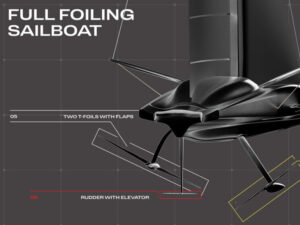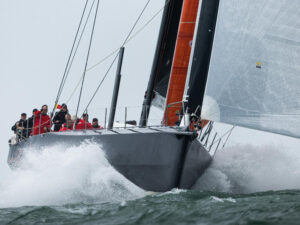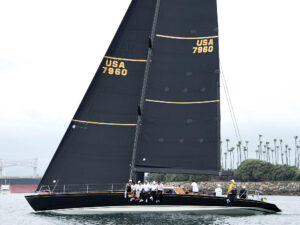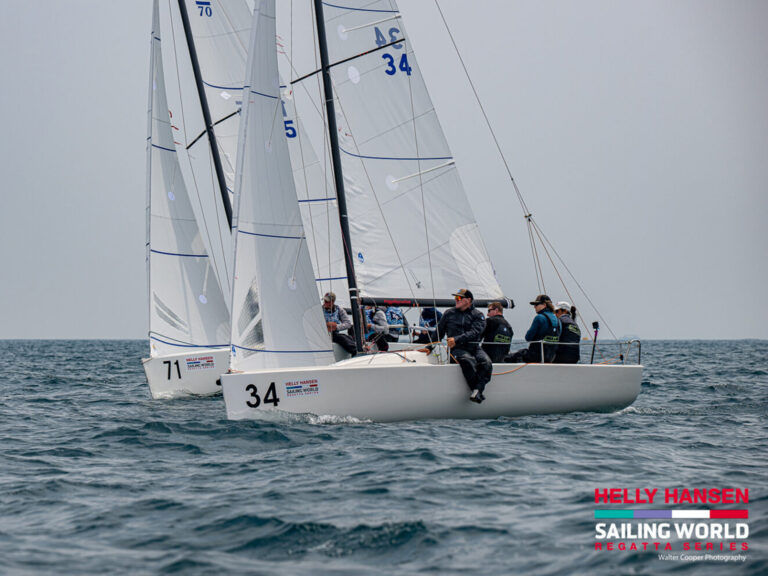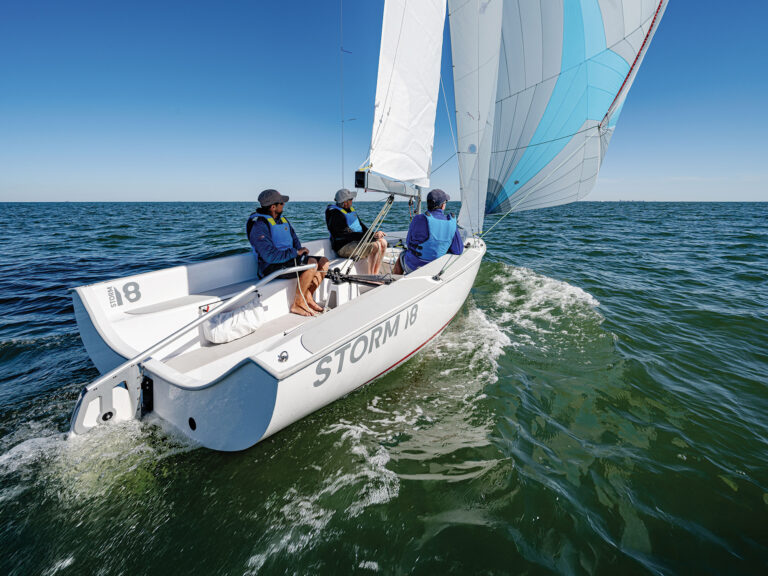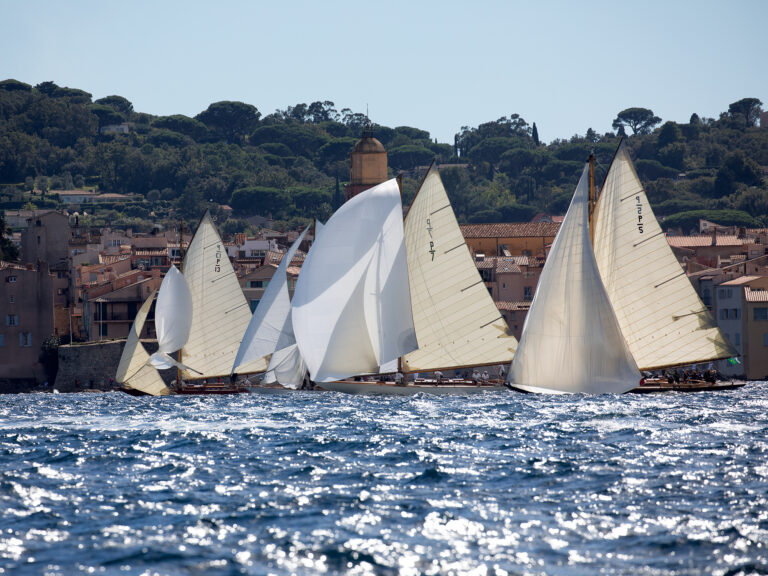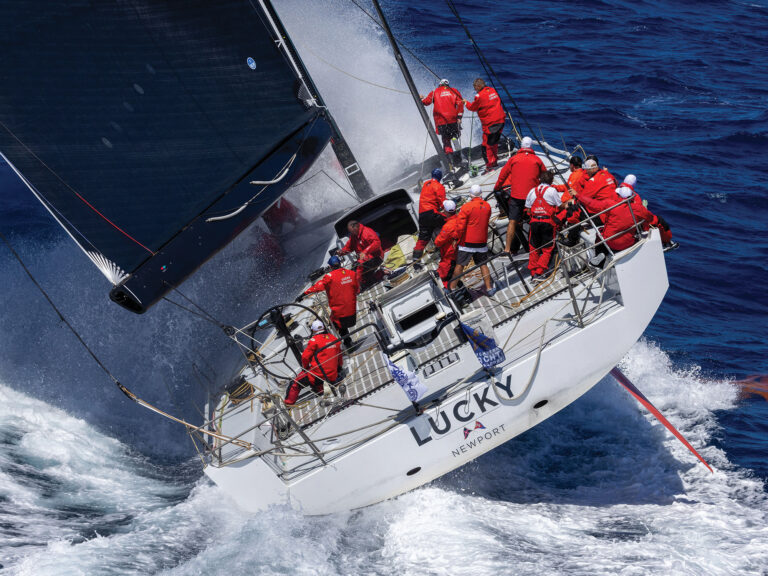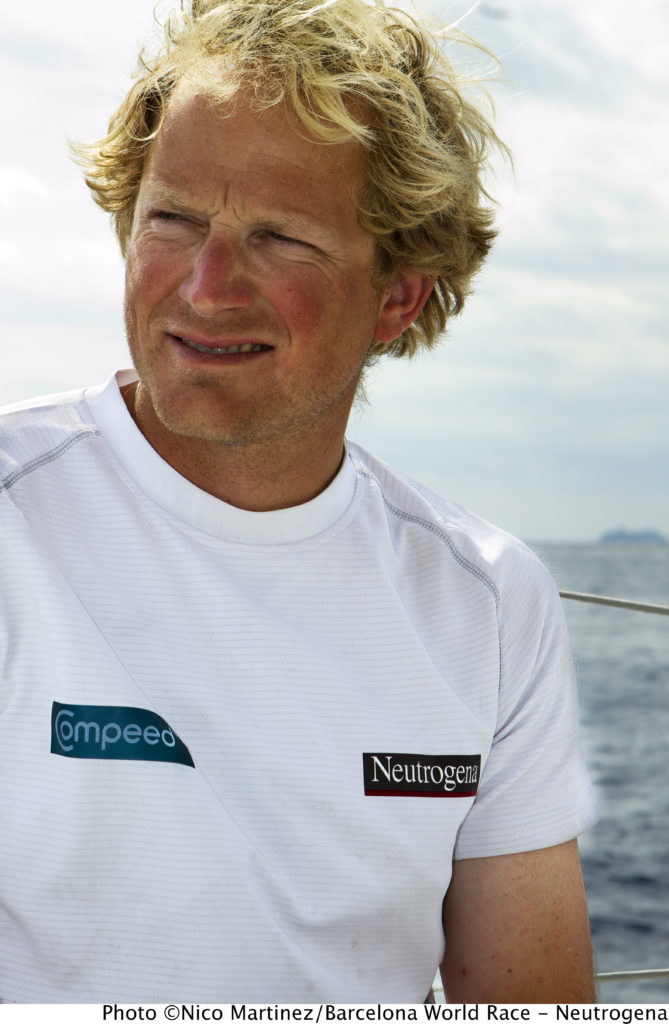
Ryan Breymaier
Any ocean-racing sailor knows that the pinnacle of solo ocean-racing (and in my view the pinnacle of ALL ocean racing) is the Vendee Globe: solo, non-stop, around the world. It is arguably the most difficult, brutal, and soul-revealing sports competition on the planet.
And for American sailors and their fans, it has long been a drama that stars other nationalities. Mike Plant was the first American sailor to try and gain an American foothold, but he was disqaulified from the first Vendee (1989-’90) for receiving outside assistance (while at anchor to make repairs in New Zealand, he was forced to accept a tow to avoid being swept ashore by heavy weather), and died sailing to the start of the second (1992-’93). It wasn’t until the 5th(!) edition of the Vendee (2004-’05) that an American, Bruce Schwab, finally completed the race. Rich Wilson, at the age of 58, became only the second American to complete the race, finishing 9th in 2008-’09 edition. And that’s it.
But sailing the race with the primary aim of simply completing it, while an enormous feat of adventure that is worthy of respect, is not the same as really RACING the Vendee Globe. And now, for the first time since Mike Plant, comes an American sailor who has the experience and solo-sailing chops to be a legitimate contender for the top end of the intensely competitive Vendee fleet. Ryan Breymaier has paid his dues, and immersed himself in the culture of offshore solo sailing, moving to France in 2008, and working on Open 60s and Open 60 campaigns, including Alex Thomson‘s Hugo Boss. Along the way he has perhaps become America’s most skilled all-around, shorthanded ocean racer, accumulating a solid racing resume, and completing the doublehanded, nonstop, 2009-’10 Barcelona World Race.
If Breymaier is ready to take on the Vendee (his goal is to be on the podium of the 2016-’17 race), the big question is whether American companies and sponsors are ready to join him. Finding sailing sponsorship in America has always been a huge challenge (just ask Schwab, or Brad Van Liew, who had success on the Around Alone/5 Oceans circuit, but was always desperately short of money). The reasons are predictable and mundane: Too many other sports, limited public interest, a lack of corporate understanding of sailing, reluctance to take a “risk,” you name it. But Breymaier offers American sponsors a chance to not just sponsor an oddball adventure, but a chance to sponsor a compelling adventure and a serious racing campaign. Breymaier is nothing if not professional, and apart from the sailing side he (with help from his wife, Nicola) is as responsive and engaging when it comes to media as any sailor I know. He knows what a professional Vendee campaign requires, and he knows what he needs to deliver to a potential sponsor. For any company that does business in Europe, especially France, there are arguments to be made.
So in some ways Breymaier’s campaign is a test of where America is today when it comes to sponsorship and sailing. If he strikes out on sponsorship and can’t get to the start line that would be a serious shame, because it is an opportunity to have an American truly in the Vendee mix. And if he succeeds, and delivers an engaging, competitive campaign, maybe he will help prove to America’s corporate world that sailing sponsorship can pay off (so if you have any ideas or suggestions for sponsorship, by all means get in touch with him; he is open to all leads).
So I am watching this one closely, and checked in with Breymaier to see how things are going:
TZ: Where does your campaign stand with regard to trying to find a sponsor, and what sort of interest or response are you getting from American companies?
RB: After a year of trying to find a sponsor by myself without success, in September I teamed up with Five West. Five West is the team who manage the HUGO BOSS IMOCA campaign with UK skipper Alex Thomson. They’ve got a great history with HB over the past 12 years and they have just resigned them until the next Vendée Globe. Five West approached me with the idea of replicating that project which I welcome. Having their experience and expertise behind me when I present my case to prospective sponsors validates my proposal and having HB as a case study endorses the quality of what we can offer a new client.
We have been working together to reach out to a variety of American and international companies with a generic proposal as well as researching a few marketing agencies. Unfortunately the latter mostly want money up front, which I don’t have. We are also going through our networks again with the new joint proposal and I’m hoping to gain a little more interest this time around. For the moment, we have received plenty of polite “nos”, both from companies and agencies. However, we know we have an incredible opportunity and product, and just have not put it in front of the right person. I’m definitely optimistic we’ll find them!
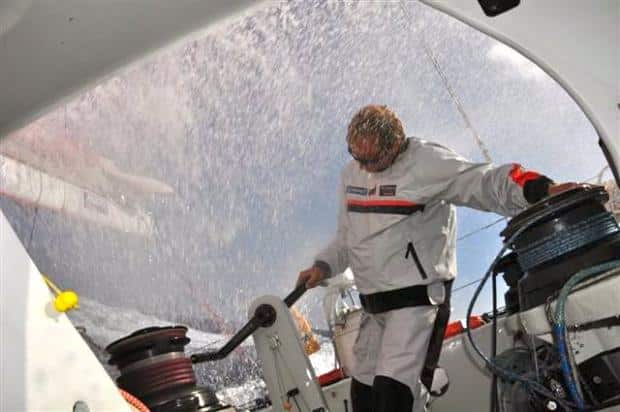
Photo: Boris Herrmann
What sort of budget do you think you will need to achieve your goal of being the first American to stand on the Vendee Globe podium?
They are not wrong when they say shorthanded ocean racing is a mechanical sport. To win you need a fast boat, and the new boats are clearly faster with each successive generation. A winning campaign also means a top quality international communications program for the sponsor around the racing events, with this in mind we are aiming for $12 million through mid 2017.
However, on Friday Open Sports Management (OSM) who are the body who commercialize the IMOCA Ocean Masters World Championship announced a new race to be part of the four-year circuit. The ‘New York to Barcelona’ is a doublehanded race starting on the June 1 and will be held every two years. The idea was to open the racing up to a more international audience, and this is a big first step. Obviously my primary aim right now is to be at the start line of that race. I am confident that if I sign a sponsor now, to charter an existing boat and have a 6-month ‘tryout’ they will quickly see the benefits of what we can offer. I think I can do this for $750k and give them a fantastic return on their investment in the 3 months run up to the race.
What is your strategy with regard to putting a competitive boat on the start line?
In an ideal world I would rent an existing boat for the New York to Barcelona and then go on with the same boat to do the Barcelona World Race, which starts on December 31, 2014.
If the sponsor is still happy at this stage (and they will be), we will start to build a new boat, which takes about a year. This will allow a full year of sailing on the new boat to work the kinks out ahead of the Vendee Globe 2016.
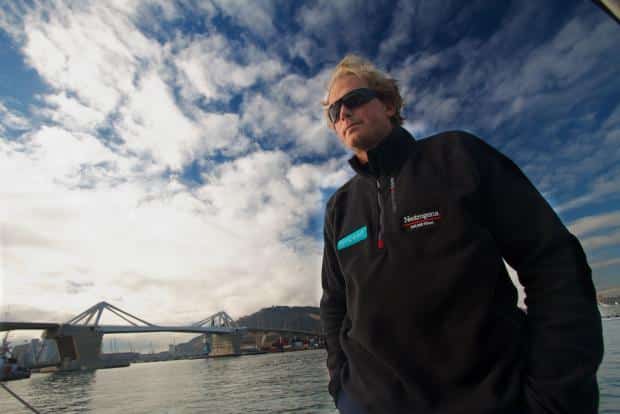
Photo: David Gomez
If you can line up a sponsor and boat, what sort of racing schedule would you like to pursue as preparation for the Vendee?
The racing schedule would include all the races on the Ocean Masters World Championship circuit. This covers the full four-year cycle and includes two around the world races, two races in the USA, two transatlantic races, and the Fastnet. There are other smaller races open to us, but first there would be a discussion with the sponsor to put together a sailing schedule that fits with their marketing strategy and communication plans.
Who do you see as the biggest challengers for a spot on the Vendee podium? What will it take to beat them?
There are so many good skippers involved in the Ocean Masters circuit that it’s hard to pick out who the biggest competition would be. Each and every guy racing these boats today is a great solo skipper, not just because of their sailing skills but also their mental capability of making it around the world alone and also the technical skills of getting the boat around with them.
If I had to pick three of the biggest challengers today, I would say Alex Thomson, Armel Le Cleac’h, and Bernard Stamm. Those guys have all got what it takes for sure.
However, we are not in 2016 yet, and by then there could well be more challengers like the hugely talented Erwan Tabarly (Eric Tabarly’s nephew and an awesome sailor in his own right) and Yann Elies, who has won the Solitaire du Figaro twice in a row (month-long series of singlehanded racing on 35-foot one-design boats).
You have spent a lot of time in France where solo ocean racing is very popular. Why do you think it has been so hard for American sailors to sell sponsors and the public on the idea of solo racing and the Vendee Globe?
You’re right, I came to France to get closer to this kind of racing, but my long-term intention is to bring it back to the USA and show how great it is! In the USA we have historically more of a culture of team sports and sports being closely linked to high physical performance. Shorthanded ocean racing is as much about the mental challenge as it is the physical, and I think European fans get more easily excited about the human adventure aspect of this kind of racing.
Also until now, because satellite communications have been so expensive, it’s been impossible to get the amazing stories back from the ocean to fans at home. In the USA, we are used to HD videos with every angle of play shown over and over again and explained in the smallest detail. In Europe, people are not used to this luxury and have been happy with distorted radio updates and out of focus photos.
However, as satellite communications become cheaper, the quality of what can be shared with the public is skyrocketing. The VOR has understood this, and the role of the Onboard Reporter is now vital to the success of their race. In the same way, with the Vendée and other shorthanded races we can provide really exciting content for our sponsors.
Finally, no sponsor will consider a ‘high risk’ investment in any sport, especially for the sums we are asking. A race with one guy sailing around the world holds its risks, and since it is little known in the USA, in the mind of a non-sailor, it is straight away “high-risk.”
My biggest challenge today is to show potential sponsors that though there’s an element of danger, it’s calculated and the boats are high-tech machines we know how to handle. We train continuously, and we know how to deal with the adversity of the oceans and what nature can throw at us.
The best way to show someone this is simply to take them sailing one time. There they see firsthand what we can do, and they understand what we are capable of.
It’s not just about the competition in ocean racing, it is about the drama and story around each race, and who doesn’t love to see triumph in the face of adversity or man versus nature with a huge dose of exciting technology and speed thrown in?
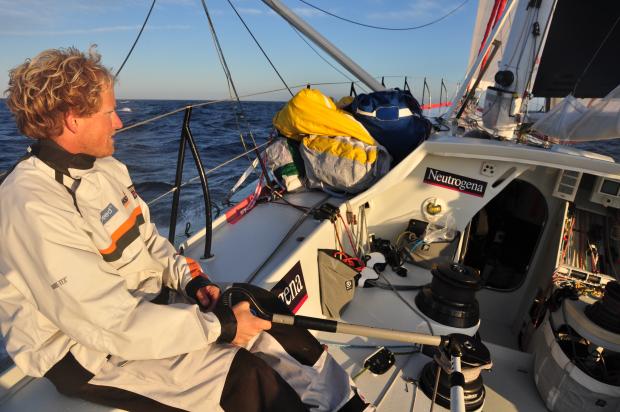
Photo: Boris Herrmann
Have you been in touch with Bruce Schwab and Rich Wilson? Or Brad Van Liew? What can you learn from them?
I have met Brad and Rich more than once, and have spoken to Bruce several times. They are all great sailors, and it’s a real shame Brad couldn’t continue with his winning streak. Both Bruce and Rich showed it is possible to get to the start of the Vendée Globe, albeit with an older boat. One thing they all have in common is that they are singleminded in pursuit of their goals, and possess a get-it-done attitude which is essential in this sport.
What draws you to solo and shorthanded racing over crewed races?
I have always been drawn more to ocean racing on big boats than smaller races around the buoys. I learnt to sail at college, and I went straight into the big-boat program, which suited my character and my physical size. My racing experience was always on crewed boats, which I still enjoy very much but from time to time. Back then I would deliver a 40-50 footer by myself, and I was comfortable doing it and happy to rely on myself.
The big change came when I went to France to work with an Open 60 team and I fell in love with the boats straight away. I am really interested in the technical side of sailing and these are a technician’s dream. Sophisticated but simple, high-tech but high-logic.
My intention was never to race the Vendée Globe. I was never one of those guys who said, “This is my dream.” However, the more often I sailed the boats, the more I grew to love the challenge of sailing on such a powerful machine with no one else around.
I came back from the Barcelona World Race in 2011 never wanting to go around again, but a week later I realized I had unfinished business. For me, the Vendée Globe is the ultimate challenge, and now I know I am capable of going out there and winning.
Stay tuned. And in the meantime, you can follow Ryan Breymaier and his sailing exploits on Twitter and Facebook.

